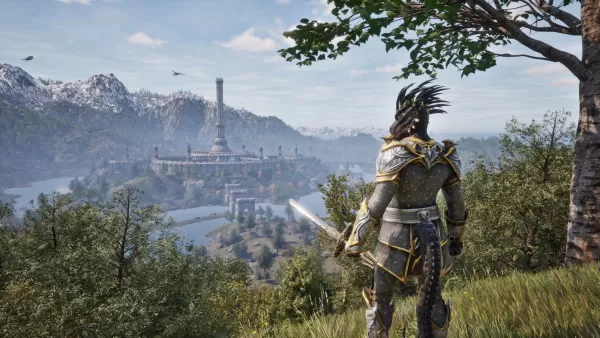"Remakes Key for Bethesda's Revival, Oblivion Shows"
By Azura, by Azura, by Azura – the rumors were indeed true. Yesterday, Bethesda set the internet ablaze by unveiling Virtuos’ remaster of The Elder Scrolls IV: Oblivion. This surprise shadow-drop, showcased during a special 'Elder Scrolls Direct,' instantly drew hundreds of thousands of concurrent players, marking a moment of global excitement and a much-needed boost for Bethesda Game Studios. The studio has faced challenges in recent years, from managing the fallout of Fallout 76’s rocky launch to the lukewarm reception of its new sci-fi venture, Starfield. Amidst fiercer competition from acclaimed RPGs like Larian Studios’ Baldur’s Gate 3 and Obsidian’s The Outer Worlds, fans have been questioning whether Bethesda has lost its touch. While Elder Scrolls 6 and Fallout 5 remain distant dreams, this re-release of Oblivion might just be the nostalgic journey fans need – albeit not the one they expected.
At its zenith, Bethesda Game Studios was a powerhouse in the RPG world. In 2020, leaked Microsoft FTC documents revealed that Fallout 4 had sold 25 million units, with over 5 million units sold in its first week alone, according to VGChartz. Fast forward to 2023, and Todd Howard announced that Skyrim had surpassed 60 million sales, boosted by numerous re-releases. In contrast, Starfield's sales figures are estimated at just over three million units a year and a half after its launch. Even considering Game Pass subscribers and the absence of a PlayStation version, these numbers might be a letdown for Bethesda. While Starfield does have its followers, their numbers pale in comparison to those of The Elder Scrolls and Fallout, and even they have expressed dissatisfaction with the game's first expansion, Shattered Space.
This situation poses a significant challenge for Bethesda. With The Elder Scrolls 6 still "years away" and Fallout 5 a mere whisper, how can this once-iconic RPG developer reignite the passion of its fanbase? The answer might lie in revisiting its storied past.
Rumors of the Elder Scrolls IV: Oblivion remaster surfaced in September 2023, fueled by leaked Microsoft documents hinting at several unannounced Bethesda projects, including a remaster of the 2006 classic. The anticipation grew until January 2025, when a former Virtuos employee spilled more beans, sparking debates among Elder Scrolls fans akin to the Stormcloaks versus Imperials divide. Last week, the floodgates opened, and the internet was set ablaze – Google searches for 'The Elder Scrolls IV: Oblivion' soared by 713% to 6.4 million in the past week. Bethesda’s reveal livestream peaked at over half a million viewers, and despite the leaks, over 600,000 tuned in to witness the re-reveal of a 19-year-old game. The fervor for the remaster crashed discount game key websites like CDKeys and slowed down Fanatical and Green Man Gaming. As of yesterday, Steam reported 125,000 concurrent players, with the game topping the best-seller charts. The enthusiasm for Oblivion among Bethesda fans burns as intensely as the flames from the Oblivion gates.
The message from players is clear: if you (re)build it, they will come. What better way to keep fans engaged during these long development cycles than to invite them back to the enchanting realms of Morrowind or the post-apocalyptic landscapes of the East Coast? From a business perspective, this strategy is a no-brainer. While Bethesda's core team focuses on new projects, trusted partners like Virtuos can leverage historic blueprints to create remasters in shorter time frames. These remasters target games with established fanbases and often introduce new generations to the magic of Tamriel or the gritty survival of the Fallout universe.
Bethesda has already demonstrated the effectiveness of this approach. During the first season of the Fallout TV show on Prime Video, Fallout 4 was discounted by up to 75%, accompanied by a timely next-gen update featuring elements from the show. As a result, Fallout 4 sales surged by over 7,500% in Europe alone, despite the game being nearly a decade old.
 Oblivion Remastered offers a visit to the past that looks like the future. Image credit: Bethesda / Virtuos
Oblivion Remastered offers a visit to the past that looks like the future. Image credit: Bethesda / Virtuos
Looking back at Microsoft’s leaked Bethesda roadmap, many noted a planned Fallout 3 remaster slated to follow Oblivion two years later. Although the original timelines have shifted – Oblivion was initially set for fiscal year 2022 – if the original gaps hold, a Fallout 3 remake might be on the horizon for 2026, coinciding with Fallout Season 2. Given the second season's shift to New Vegas, could Bethesda be planning a surprise New Vegas remake? The alignment of the first season with Fallout 4’s vibe suggests that Bethesda might be gearing up for an even more strategic move with the New Vegas-centric second season. After shadow-dropping Oblivion, it’s not beyond the realm of possibility that a New Vegas Remastered trailer could be waiting at the end of Fallout Season 2’s finale.
The message from players is clear: if you (re)build it, they will come. However, if there’s one game in Bethesda’s catalog that truly deserves a remake, it’s The Elder Scrolls III: Morrowind. Fans have been clamoring for this for years, with some even remaking Morrowind using Skyrim’s tools, as seen in projects like Skyblivion. Yet, Morrowind presents unique challenges. It stands at the crossroads of Bethesda’s evolution, built differently from modern Elder Scrolls games. It's only partially voiced, relies heavily on text-based storytelling, lacks quest markers, and features simplistic combat physics. While Virtuos successfully updated some of Oblivion’s clunkier systems, Morrowind is essentially a complex system itself. Its charm lies in its quirks, but these also make it a challenging game to modernize. Remaking Morrowind is a delicate balancing act: update it too much, and you risk losing its original magic; leave too many old systems intact, and it might feel outdated to new players.
When a studio becomes synonymous with a gaming genre, the challenge is to innovate while retaining its audience. Rockstar Games has kept Grand Theft Auto fans engaged for over a decade through GTA Online, funding the rumored hefty budget for GTA 6. Bethesda’s core appeal lies in its richly detailed, expansive single-player worlds – a formula that Elder Scrolls Online and Fallout 76 haven’t quite replicated. The overwhelming response to Virtuos’ Oblivion remaster shows that gamers are eager to revisit Bethesda’s classics. However, not every remaster is guaranteed success – the careful craftsmanship behind this particular remaster contrasts sharply with the less well-received GTA Definitive Editions. For Bethesda, breathing new life into its old classics could be the key to regaining its crown as the king of the modern RPG.
- 1 STARSEED Update: Codes for January 2025 Released Feb 25,2025
- 2 Pokémon TCG Pocket: Wonder Pick Date, Time, and Promo Cards – February 2025 Mar 03,2025
- 3 How to Get All Ability Outfits in Infinity Nikki Feb 28,2025
- 4 Black Myth: Wukong Tops Steam Charts Days Before its Launch Jan 07,2025
- 5 Ukrainian Internet Stalled as 'S.T.A.L.K.E.R. 2' Release Overwhelms Dec 30,2024
- 6 inZOI, a Korean Sims-Like, Delayed to March 2025 Mar 01,2025
- 7 Starseed Asnia Trigger Codes (January 2025) Mar 06,2025
- 8 Assassin's Creed Shadows Postponed to March 2025 for Enhancements Feb 21,2025
-
Budgeting & Investing: Your Guide to Financial Apps
A total of 9
-
Addictive Hypercasual Games for Quick Play
A total of 10
-
Best Role Playing Games for Android
A total of 10






























